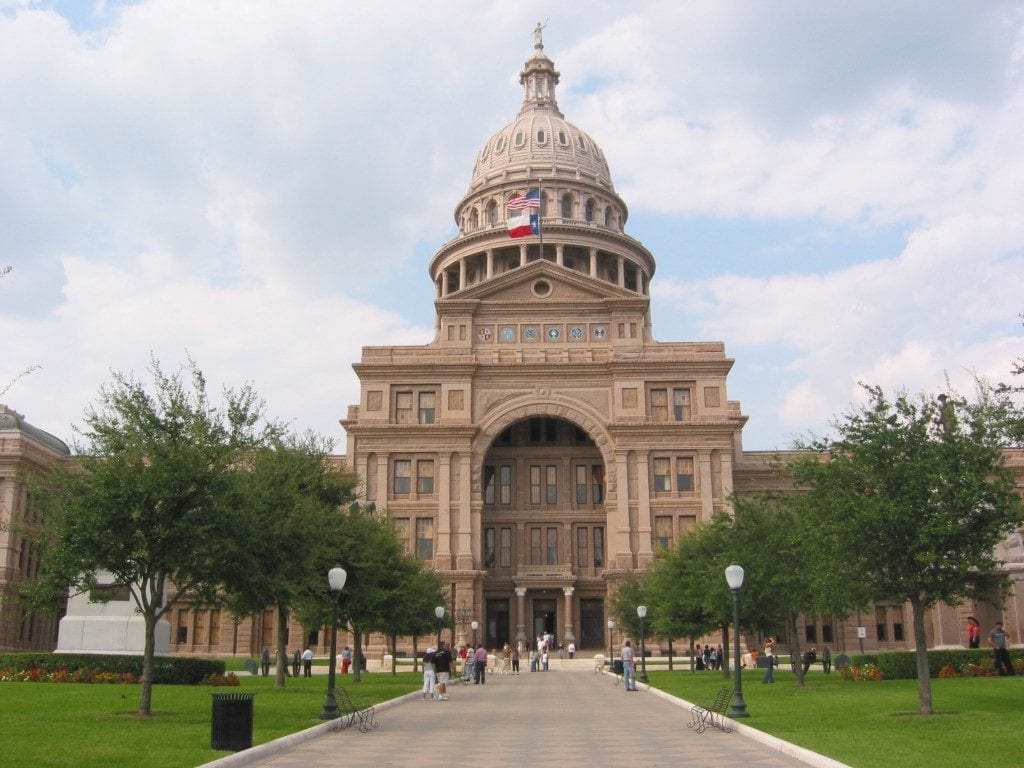
Return to the October 2020 newsletter
Around the Texas Capitol:
Early voting underway, another election in December & more
By Lauren Spreen, Shayne Woodard and J Pete Laney
TAD Governmental Affairs
Early voting is now underway for the Nov. 3 general election, thanks to an extra six days of early voting mandated by Gov. Greg Abbott. Early voting ends Friday, Oct. 30.
While no statewide races are on the ballot, up for grabs are every seat in the Texas House of Representatives and U.S. House of Representatives, half of the Texas Senate, one of Texas’ U.S. Senate seats, and hundreds of local offices across the state.
Not sure who’s on your ballot? What ID you need in order to cast your vote? Where the nearest polling place is? The Texas Secretary of State’s Vote Texas website has all the answers.
The Texas Association of Dairymen encourages you to vote!
Below is a roundup of other recent actions of interest in and around the Texas Capitol.
Senate District 30 election still undecided
Some of you have already been to the polls recently to cast your ballot in the Sept. 29 special election to fill the Senate District 30 seat to fill the unexpired term of Senator Pat Fallon (R-Prosper), who is the Republican nominee in Congressional District 4.
No candidate received a majority of votes in the special election, and Abbott has set a runoff election date for Dec. 19 for the top two vote getters, Republicans Shelley Luther, the Dallas salon owner who was jailed over her refusal to shut down her business in defiance of Abbott’s order connected to COVID-19, and State Rep. Drew Springer of Muenster.
Total voter turnout was 10.9% (68,807 out of 631,280 registered voters). Here are the results:
- Shelley Luther (R-Pilot Point) — 22,242 votes — 32.04%
- Drew Springer (R-Muenster) – 22,127 votes – 31.87%
- Jacob Minter (D-Anna) – 14,825 votes – 21.36%
- Chris Watts (R-Denton) – 4,321 votes – 6.22%
- Craig Carter (R-Nocona) – 3,448 votes – 4.97%
- Andy Hopper (R-Decatur) – 2,456 votes – 3.54%
SD 30 includes Archer, Clay, Cooke, Erath, Grayson, Jack, Montague, Palo Pinto, Wichita, Wise and Young counties and parts of Collin and Denton counties. According to the TexasCandidates.com partisan index, SD 30 is 74.9% Republican.
Sunset Commission recommends the Texas Department of Agriculture absorb the Texas Racing Commission
The Sunset Commission has proposed that the Texas Racing Commission (TRC) be folded into the Texas Department of Agriculture (TDA). Under the Sunset proposal, the TRC would become a governor-appointed advisory board that would report to the Agriculture Commissioner. Agriculture Commissioner Sid Miller has expressed he is open to taking on regulation of the racing industry.
What is the Sunset Commission? Each legislative interim the Commission evaluates a roster of state agencies (each agency generally is reviewed every 10 years), issues recommendations, hears public testimony, and decides on a package of changes to bring to the full Legislature. The Legislature must pass a bill to continue each agency (sometimes with adopted changes) or abolish it.
The Texas Racing Commission is primarily funded by racetrack licensing fees. It has never produced the parimutuel racing revenue of $110 million each year for the state. And attendance at racing and racetrack revenue have declined over the past decade.
The Commission estimates that moving the TRC under the TDA could save about $2.4 million in general-revenue dedicated funds over five years and cut the staff by 4.5 full-time employees. Agriculture Commissioner Sid Miller is a one of two ex-officio members of the commission.
The Sunset Commission is expected to vote on the report at its next meeting, which has not yet been scheduled.
Abbott issues executive order to open bars in qualifying counties
On Oct. 7, Abbott issued an Executive Order permitting county officials to begin working with the Texas Alcoholic Beverage Commission (TABC) to allow bars to re-open as of Oct. 14. Bars in counties that opt in will be able to resume in-person services at 50% capacity.
For Trauma Service Areas (TSAs) where COVID-19 hospitalizations are less than 15% of hospital capacity, the county judge may authorize the opening of bars and similar establishments at 50% occupancy. If the county judge authorizes the opening of these establishments, certain protocols must be followed. As recommended by trade associations representing bars, dance floors at bars and similar establishments must remain closed.
Consistent with protocols for restaurants, all patrons must be seated while eating or drinking (with limited exceptions for sampling at breweries, distilleries and wineries), and must wear masks when they are not seated at a table. Additionally, tables must be limited to six individuals or less and all establishments must follow specific curfew guidelines.
In addition to bars being allowed to reopen, businesses at a 50% capacity may now expand to a 75% capacity, including movie theaters, bowling alleys, bingo halls and amusement parks.
Read the Governor’s Executive Order (GA-32) here.
Legislators call for statewide broadband plan
In September, 88 Texas legislators sent a letter to Abbott asking for his leadership in developing a statewide broadband plan. The letter was signed by 11 Texas Senate members (seven Republicans and four Democrats), and by 77 Texas House members (48 Republicans and 29 Democrats). The lead signatures were from Rep. Trent Ashby (R-Lufkin) and Sen. Robert Nichols (R-Jacksonville).
The letter said, in part, “As you are aware, broadband is more important than ever during these unprecedented times, and we applaud the steps you have taken in closing the digital divide in Texas. The Governor’s Broadband Development Council is exploring barriers impacting unserved areas, and your partnership with the Texas Education Agency forming Operation Connectivity helped provide mobile hotspots and e-learning devices for students and families as they transitioned to remote learning. However, we fear that rural communities are continuing to be left behind. For example, Operation Connectivity’s plan primarily benefited those households with broadband infrastructure and/or cellular availability. Many rural students live in areas where neither broadband nor cellular service is available. Students, families, and schools in rural communities without this critical infrastructure were left to address the situation on their own.”
The legislators cited recent data and maps produced by Connected Nation Texas that show more than 800,000 rural Texans do not have adequate broadband infrastructure, thus limiting their access to telework or essential services, such as remote learning and telemedicine.
State sales tax revenue totaled $2.57 billion in October
State sales tax revenue totaled $2.57 billion for sales in September, 6.1% less than in September 2019. The majority of September sales tax revenue is based on sales made in August and remitted to the agency in September. COVID-19 infection rates in August likely continued to suppress economic activity, according to the Comptroller.
“The COVID-19 pandemic and low price of crude oil continue to weigh on the Texas economy and sales tax revenue,” said Comptroller Glenn Hegar. “As was the case the last month, state sales tax receipts from all major sectors, other than retail trade, were down compared with the same month last year, with the steepest declines in the oil and gas-related sectors.”
Decrease in the August unemployment rate
The Texas Workforce Commission (TWC) announced that Texas in August saw a decrease in the state’s seasonally adjusted unemployment rate to 6.8%. August is the fourth consecutive monthly decrease and the lowest rate since March 2020 when the Texas economy was initially impacted by the COVID-19 pandemic.
Texas is below the national seasonally adjusted rate of 8.4%.
The TWC also announced that with Texas’ unemployment rate falling to 6.8%, Texas will no longer have access to additional unemployment insurance benefits that would have kicked in after traditional benefits and extended benefits (EB) under the CARES Act are exhausted. Provisions under that act will continue to remain in place until December 26, 2020.
The High Unemployment Period (HUP) is an extension for states with unemployment rates over 8% for over three months as determined by the U.S. Department of Labor. Texas triggered on to HUP benefits in June, but since Texas’ unemployment rate fell below that threshold in August, the state lost eligibility. Traditional benefits as well as extended benefits (EB) will remain in place.
Abbott renews state disaster declaration for COVID-19, updates disaster declaration for regions with high COVID-19 hospitalizations
Abbott on Oct. 8 renewed the disaster proclamation for all counties in Texas. Read the Governor’s proclamation in full here.
The governor also amended Executive Order GA-31, redefining “areas with high hospitalizations” to mean any Trauma Service Area that has had seven consecutive days in which the number of COVID-19 hospitalized patients as a percentage of total hospital capacity exceeds 15%, until such time as the Trauma Service Area has seven consecutive days in which the number of COVID-19 hospitalized patients as a percentage of total hospital capacity is 15% or less. Read the governor’s proclamation in full here.
A current list of areas with high hospitalizations is maintained on the DSHS website here.


